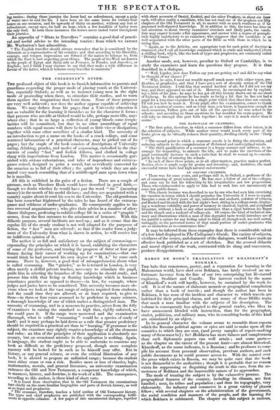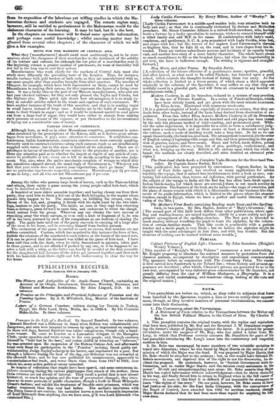BARON DE BODE'S TRANSLATION OF KIIANIKOFF'S BOKHARA.
THE halo that remoteness, poetry, and a reputation for learning in the Mahometan world, have shed over Bokhara, has lately received an un- fortunate increase from the fate of our two enterprising but ill-starred explorers, Stoddart and Conolly. The interest excited by the name of Khauikoff's work will hardly, however, be sustained by the work it- self. It is of the nature of elaborate memoir or geographical compilation rather than a book of travels ; and though the author has been in Bokhara it has none of the incident and character to which travels are indebted their principal charm, and not many of those lifelike traits that mark a man familiar with the subjects of his description. The volume is consequently less adapted to the general reader, who likes to have amusement blended with instruction, than for the geographer, statist, politician, and military man, who in consulting books of this kind are stimulated by an object.
In its general character the volume seems to resemble those reports which the Russian political agents or spies are said to make upon all the countries to which they are sent, (and pretty samples of report-making many of them must be) ; but Bokhara has more fulness and completeness than such diplomatic papers can well attain ; and some parts— as the chapter on the career of the present Amir—are almost historical. Khanikoff, as the name indicates, is a Russian ; and he professes to com- pile his account from personal observation, previous authors, and such public documents as he could procure access to. With the control over the press which exists in Russia, we may be quite sure that the book is not distasteful to the authorities ; though it is probable that no reason exists for suppressing or disguising the truth in this case, from the re- moteness of Bokhara and the inaccessible nature of its approaches.
The mode of treating the subject is by the exhaustive process. The geographical features of the country, including its climate, are first handled ; next, its tribes and population ; and then its topography, very elaborately. Its industry and commerce in a great variety of phases follow ; with several chapters on the administration of the government, the social condition and manners of the people, and the learning for which Bokhara is celebrated. The chapter on this subject is curious,
aant its exposition of the laborious yet trifling studies in which the Ma- hometan doctors and students are engaged. The remote. region may, however, still be entitled to preeminence in the Mahometan world for the ehelterate character of its leartung. It may be bad, but it is the best.
k the chapters on commerce will be *and some specific infirmation, and perhaps some useful knowledge ; whilst amusing matter may be glbaned- from several other chapters ; of the character of which we will give, a few examples.
BENTS JOE THE NARRETt3 OF CENTRAL MEAN
What they finanufneturersi should avoid most assiduously is not to be over- anxious about the cheapness of their merchandise to the detrienent of the solidity of its. texture and odours; for although the low price of a merchendiee may in the beginning attract a greater number of p.urch&sers, its want of durability will not fail in the long run to cool their ardour. Manufacturers who- work chiefly for the markets of Central Asia must also study more diligently the prevailing taste of the Asiatics. Thus, for instance, muslin turbans with gold borders at heth ends, as they are manufactured with us, amore sought after than muslins brought from other quarters. The muslins of 0.11mgow„ for example, which have birds represented on them, cannot be used by Mussalmans in making their mama, for they represent the figure of a living crea- ture. It was a lucky idea on the part of our Moscow manufacturers, who sent out last year checked turbans; for they not only pleased the Tajiks and Uzbeks, but the Afghans also. Their quick sale shows how advantageous it is to study va- riety in saleable articles suited to the wants and caprices of one's customers. We heve another instance of the truth of this assertion, and that is in sending sugar in small haves instead of large ones. Asiatics are in the habit of making pre- seats to their friends in sugar; and as it would be reckoned uncivil to send pieces mit from a large loaf of sugar, they would have either to abstain from malting such presents on account of the expense, or put themselves to the inconvenience of laying out a considerable sum of money.
TARTAR IDEAS OF COMMERCE.
Although here, as well as in other Mussuinian countries, government is some wheerestsicted by the prescriptions of the. Miran, still, as it derivea great advan- tages from merchants' it pays some attention to commerce. It establishes cus, torahou,ses, builds karavanserais„ constructs cisterns—or, more correctly speaking, formerly. used to constructeistern.s—aloog such caravan:roads as are insii,&iently supplied with water: but to this alone is limited all its solicitude. There are no Iegea favour of merchants of one nation to the prejudice of another, nor is thereany attention paid as to whether the. import or export. of any article of com- merce be profitable or not; every one is left to decide according to his own judg- ment_ But„ also,. when the native merchants complain of wrongs to which. they am sometime& exposed abroad, the usual reply of Government is, ,i Wherever you find that your trade does not answer your expectations, don't, go there." There are no particular enactments respecting commerce. Mussulinans pay 2i per cent, or cumin forty; and all who are not Miissulnuuis pay 5 per cent.
ROUGH SPORT.
Among the tribes, wha possese large herds of horses,. such as the Naimen-kilital and otherek_there exists a game among the young people called link-ban, which may be described as follows. A. hundred or more riders aseeruble together; and having chosen one from their party, they send him to fetch a kid out of the flock belonging to the master whose =they happen to be. The messenger, on fulfilling. his errand, cuts the. of the mei,. grasping it firmly with his right hand, by the twa hind- lege, hastens to join the party. The latter, as, soon as they espy him returning fnena.a distance, press fors, to meat him, and endeavour to wrest the slimgh te.red animal from his grasp Whenever any one obtains the rare sums* of snatching away the whore careass„ or es -en only: a. lirab or fragment of it, he seta off in. hie tarn, pursued. hy such of his corapamona as are desirous of sharing the spoil. The game lasts until one of the party succeeds in carrying off a large slice of the meat to his home, and in screening himself from farther pursuit. The excitement of the game is carried to such an excess, that murders are not seldom committed. Custom, which has acquired in this instance the force of law, forbids therelations of the murdered to seek redress at the hands of the murderers, if it cam be proved that the deceased. was kilted at the game of kuk-bari. I have been. told that evan the- Amir, when he visits Samarkand IR SELIIMni. takes part. in these games, and is not offended if puehed by any one,. or if he happens to re, ceiee a lash with a whip, as the latter can hardly be avoided at the first scramble for the slaughtered kid; because all the riders get .jammed together, and then each with his kamchik deals blows right and left,. endeavouring to clear the way for iis hoina



























 Previous page
Previous page